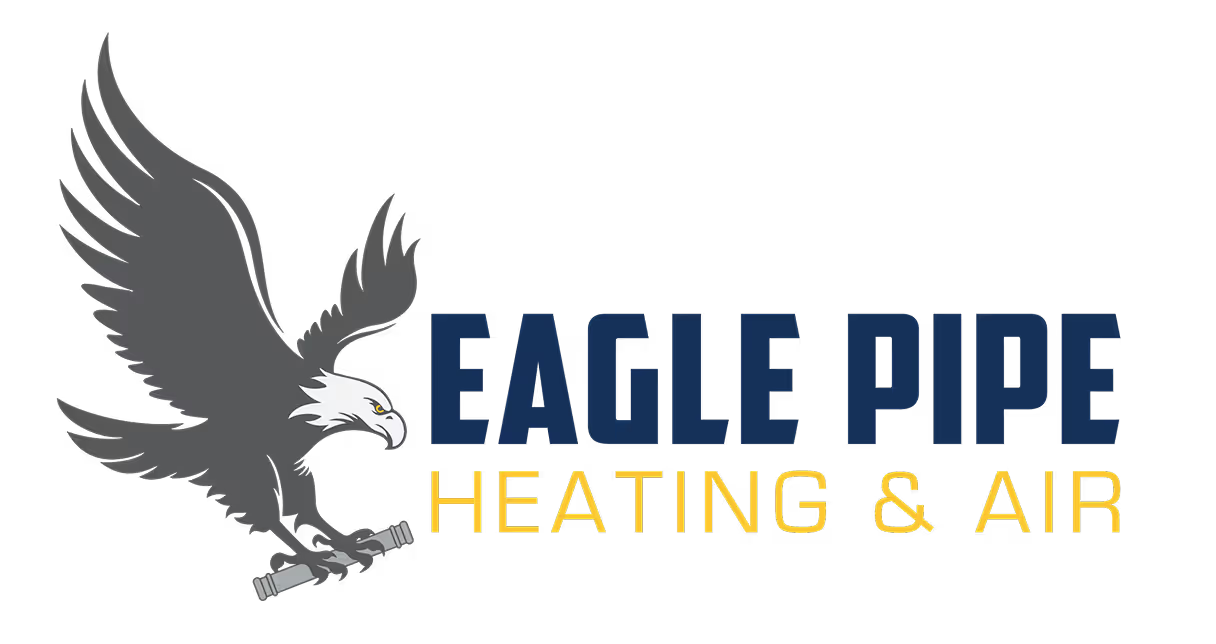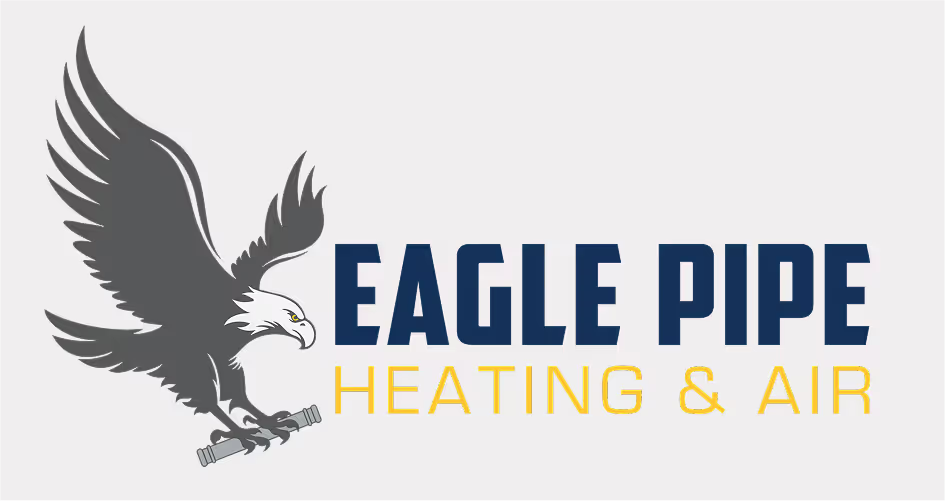Out with the Old: Your Guide to HVAC System Replacement

Why Your Home Comfort System Matters More Than You Think
An HVAC system replacement is a major home investment that impacts your daily comfort, energy bills, and property value. When your system isn't working well, the whole household feels it. Most homeowners eventually face this decision when their system struggles with temperature, energy bills rise, or repairs become too frequent.
When to Consider Replacing Your HVAC System:
- Age: Systems over 10-15 years old (AC/heat pump) or 15-20 years old (furnace).
- Frequent Repairs: Multiple service calls a year or repair costs nearing 50% of replacement.
- Rising Energy Bills: Unexplained increases in utility costs.
- Comfort Issues: Uneven temperatures, high humidity, or poor air quality.
- Strange Noises or Smells: Grinding, banging, or burning odors.
Replacing your system isn't just about fixing a problem. Modern systems offer superior energy efficiency, improved indoor air quality, and smart features. The right replacement can cut heating and cooling costs by up to 20% while making your Kitsap or Jefferson County home more comfortable.
This guide covers everything you need to know about HVAC system replacement, from recognizing the signs and understanding costs to navigating the installation process and choosing the right contractor.
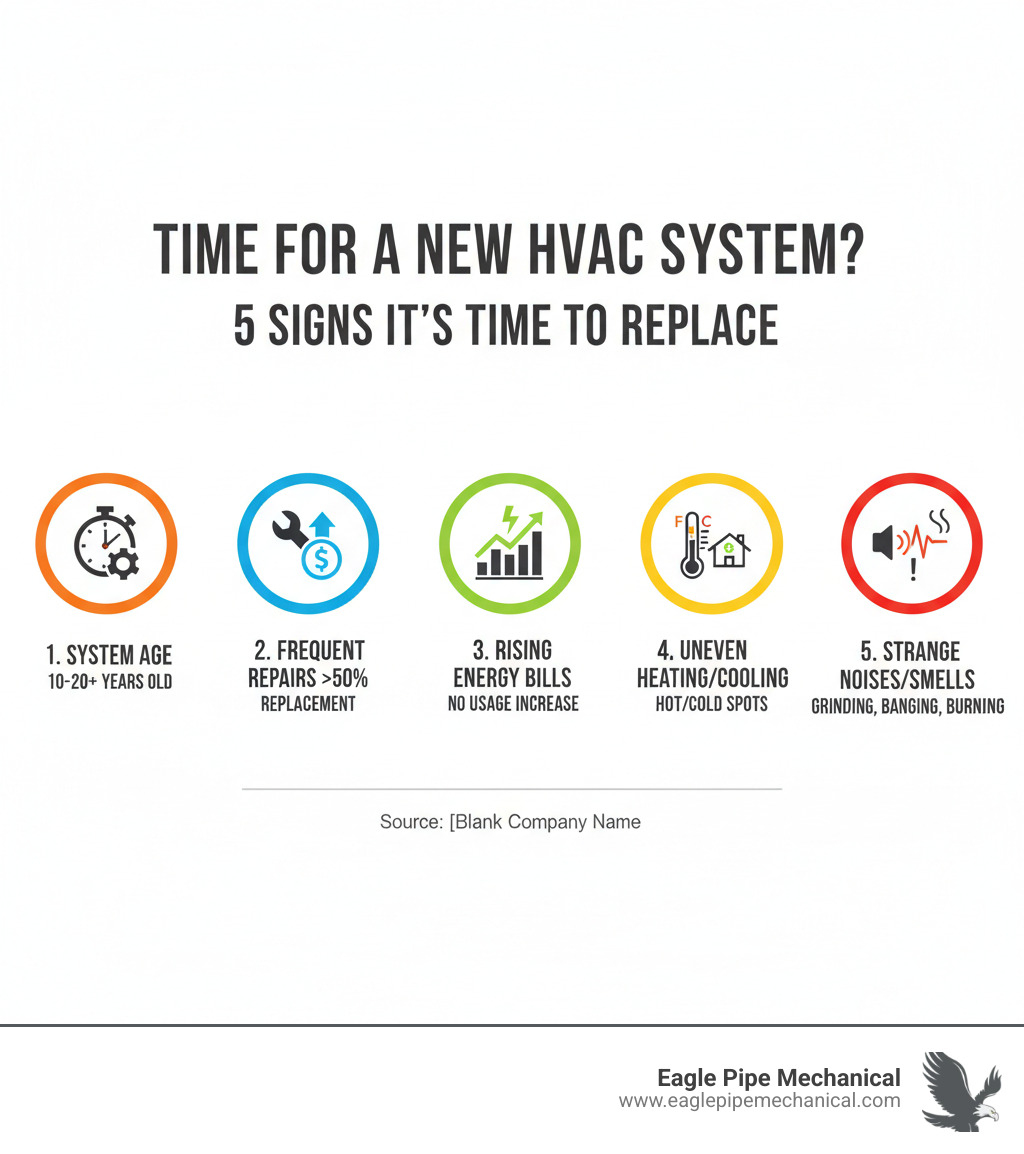
Is It Time? Key Signs You Need an HVAC System Replacement
Your HVAC system provides clear signals when it's struggling. Recognizing these signs can help you avoid a sudden breakdown during extreme weather.
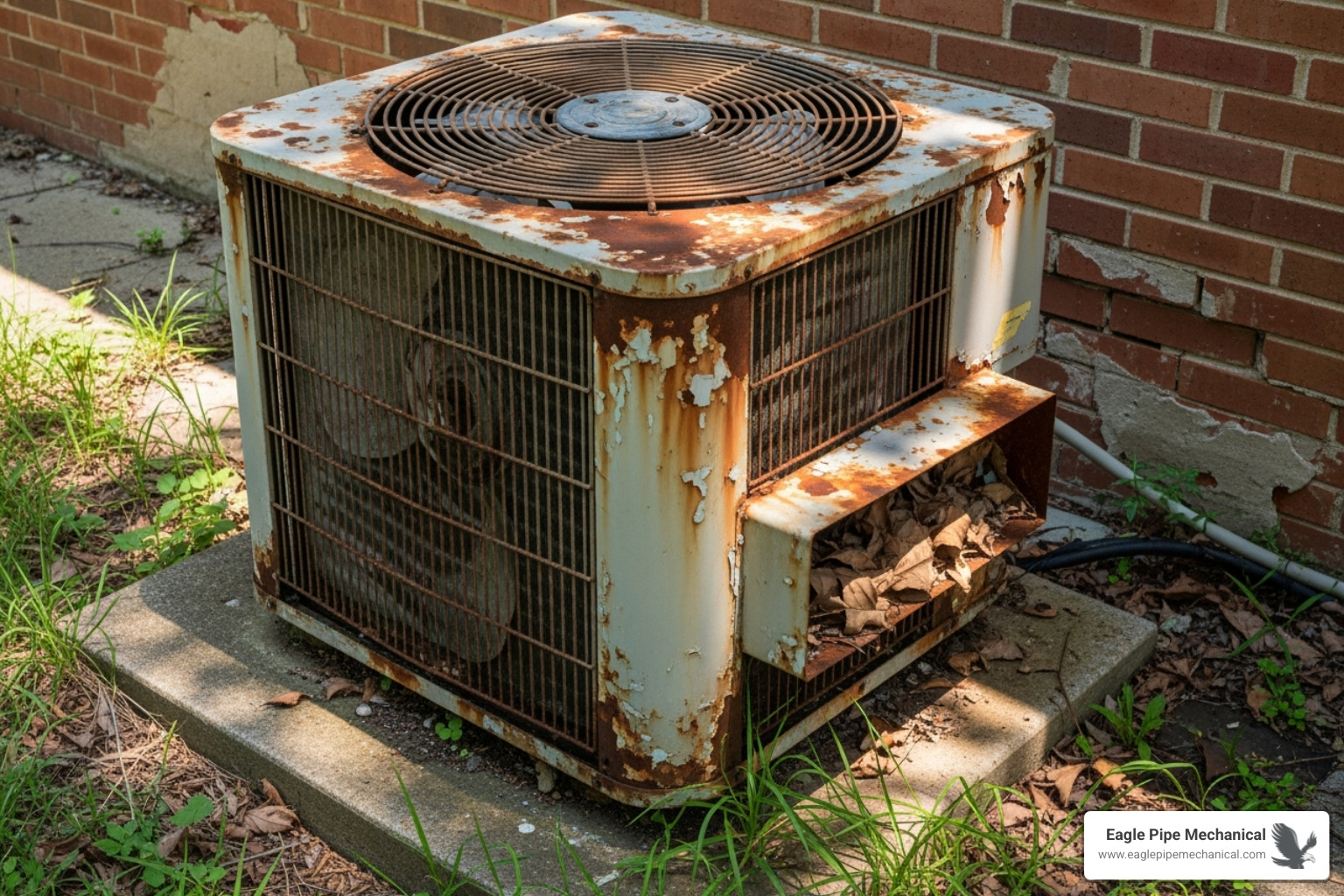
Key indicators that you may need an HVAC system replacement include:
- Age: The most straightforward sign. Air conditioners typically last 10-15 years, furnaces 15-20 years, and heat pumps 10-20 years. As units pass these milestones, their efficiency drops. Our guide on Signs You Need an HVAC Replacement offers more detail.
- Frequent Repairs: If you're calling for service more than once a year, the costs can add up quickly. It's often more economical to invest in a new system than to continue patching an old one.
- Rising Energy Bills: A steady climb in your utility bills, without a change in usage, points to declining system efficiency. Older units burn more energy to provide the same level of comfort, as noted by the Energy Star program.
- Inconsistent Comfort: If some rooms are hot while others are cold, your system is failing to distribute air effectively. You may also notice poor indoor air quality, excessive dust, or high humidity in the summer.
- Strange Noises and Smells: Grinding, banging, or squealing sounds signal mechanical failure. Burning or musty odors are also urgent warnings to call a professional.
Repair vs. Replace: Making the Call
Deciding whether to repair or replace can be tough. A good guideline is the 50% rule: if a repair costs 50% or more than a new HVAC system replacement, replacement is usually the smarter financial choice. Age is also a major factor. A major repair on a 12-year-old air conditioner often means it's time to replace, while a newer system may be worth fixing. Explore this further in our guides on AC Replacement and Furnace Replacement.
An expired warranty can also tip the scales. A major component failure, like a compressor or heat exchanger, is costly to fix out-of-pocket, whereas a new system comes with fresh warranty coverage.
System Lifespan and Maintenance
While systems have typical lifespans, their longevity is heavily influenced by two factors: climate and maintenance. Our mild coastal climate in Kitsap and Jefferson Counties is less harsh on equipment than in other regions. However, the real secret to a long life is regular maintenance. Consistent tune-ups and filter changes can add years to your system's performance, much like regular oil changes for a car. For specific advice on heat pumps, see our guide on When to Replace Your Heat Pump.
Decoding the Costs and Savings of a New HVAC System
An HVAC system replacement is a significant investment, but it's one that can pay you back through lower energy bills, improved comfort, and higher home value. While the upfront cost is substantial, a modern, energy-efficient system can cut utility bills by 20% or more.

Based on 2025 national averages, an HVAC system replacement typically costs between $11,590 and $14,100. Think of it as upgrading from a gas-guzzler to a fuel-efficient modern car—the initial cost is higher, but the monthly savings are immediate. Our guide on HVAC Replacement to Maximize Efficiency explains how. We also offer Financing in Poulsbo WA to help this investment fit your budget.
Average Replacement Costs
Costs vary based on your home's needs, ranging from $5,000 to over $30,000. For a typical 2,000-2,500 sq. ft. home in our area with an AC and gas furnace, the average is around $13,430. Here's a general breakdown by system type:
These national averages include equipment and professional installation.
Key Factors Influencing Price
Several factors determine the final cost of your HVAC system replacement:
- System Size: Measured in tons, the capacity must match your home's needs. Larger capacity costs more.
- Home Size and Layout: Square footage, ceiling height, window quality, and insulation all affect the required system size.
- Brand and Quality: Premium brands cost more but offer higher efficiency, advanced features, and better warranties.
- Installation Complexity: Difficult-to-access locations, electrical upgrades, or equipment relocation will increase labor costs.
- Ductwork Condition: Leaky or improperly sized ducts may need sealing or replacement, adding to the project cost.
- Seasonal Demand: Scheduling installation during the milder spring or fall can be more cost-effective than during peak summer or winter seasons. For local insights, see our page on HVAC Replacement Silverdale WA.
Energy Efficiency and Long-Term Savings
Efficiency ratings tell you how much comfort you get for each dollar spent on energy. Higher ratings mean greater long-term savings.
- SEER2 (Seasonal Energy Efficiency Ratio 2): Measures cooling efficiency. A higher SEER2 rating means lower electricity bills in the summer.
- AFUE (Annual Fuel Utilization Efficiency): Shows how efficiently a furnace converts fuel to heat. A 95% AFUE furnace turns 95 cents of every dollar into heat.
- HSPF2 (Heating Seasonal Performance Factor 2): Measures a heat pump's heating efficiency. Higher numbers mean lower heating costs.
High-efficiency systems cost more upfront, but ENERGY STAR® certified systems can save up to 20% on heating and cooling costs. Use our SEER Calculator to estimate your potential savings.
Rebates and Tax Credits
You don't have to bear the full cost alone. The Inflation Reduction Act of 2022 offers generous federal tax credits, such as up to $2,000 for a qualified heat pump. State and local utility rebates can provide thousands more, especially for high-efficiency systems. The key is choosing ENERGY STAR® qualified units. We track current offers on our Promotions page to help you maximize your savings.
The Replacement Process: From Assessment to Installation
A professional HVAC system replacement follows a clear path. The process begins with a thorough home assessment, moves to system selection, proceeds to installation day, and finishes with final testing to ensure optimal performance.
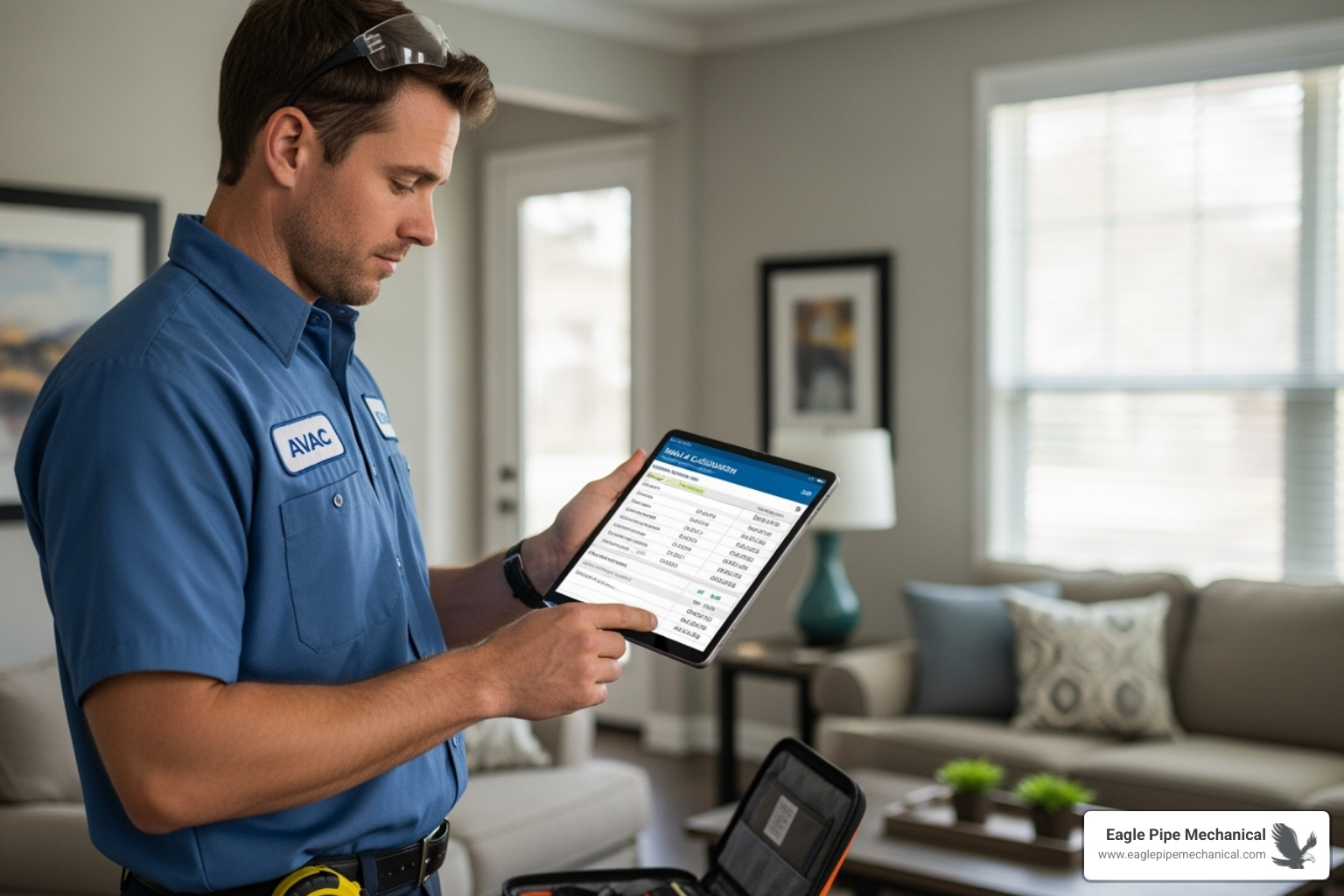
Our page on HVAC Replacement Process Expectations offers more detail, and our HVAC Installation Kingston Guide provides local insights.
Step 1: Professional Assessment and Manual J Load Calculation
This first step is critical. A Manual J load calculation is a detailed, room-by-room analysis that determines the precise heating and cooling your home needs. It's a scientific calculation, not a guess based on square footage. The assessment considers our local climate, your home's insulation, windows, orientation, and air leakage.
The main goal is to avoid the dangers of improper sizing. An oversized unit will cycle on and off too frequently, failing to dehumidify your home, creating uneven temperatures, and wearing out faster. An undersized unit will run constantly, struggling to keep you comfortable and leading to premature failure. A proper Manual J calculation ensures your new system is perfectly sized for maximum comfort and efficiency. For more technical details, see this resource on Pre-Retrofit Assessment of Existing HVAC Systems.
Step 2: Choosing Your New System and Upgrades
With the right size determined, you can select equipment that fits your comfort goals. Common system types include traditional split systems, highly efficient heat pumps (ideal for our climate), and versatile ductless mini-split systems for homes without ductwork. Our article on Ductless Mini Split Systems Advantages explores this popular option.
This is also the perfect time to consider upgrades to improve indoor air quality (IAQ), such as advanced filters, UV lights, or whole-home humidifiers. Integrating a smart thermostat offers remote control, automated scheduling, and energy savings. Learn more in our guide on Choosing Smart Thermostat Installation.
Step 3: The Role of Existing Ductwork
Your ductwork is the hidden player in your HVAC system's performance. During our assessment, we thoroughly inspect it for issues. Leaky, damaged, or improperly sized ducts can waste up to 30% of your conditioned air, forcing your new system to work harder and driving up bills. Leaks also compromise indoor air quality by pulling in dust and contaminants from attics or crawl spaces.
If we find problems, we'll discuss whether to seal or replace the ducts. Minor leaks can be sealed, but severely damaged or undersized ductwork may require replacement. Ductwork modification costs typically range from $2,100 to $4,000. Addressing ductwork issues is essential to get the full performance and efficiency from your new HVAC system replacement.
Making the Right Choice for Your Home
Choosing a new HVAC system involves more than just the equipment. Who you hire to install it is just as critical for your long-term comfort and satisfaction. These decisions impact your energy bills, system reliability, and home value for years.

We offer comprehensive HVAC Services Provided to ensure your peace of mind. Let's explore how to make the smartest investment.
Benefits of Replacing the Entire System at Once
When one component fails, it's tempting to replace only that part. However, we strongly recommend replacing the entire system at once, especially if the components are of a similar age. This approach ensures you get a matched system, where the indoor and outdoor units are designed to work together seamlessly.
Why does this matter?
- Optimal Efficiency: You'll only achieve the manufacturer's advertised efficiency ratings (like SEER2 and AFUE) with a complete, matched system. Mismatched components lead to higher energy bills.
- Improved Performance: Matched systems provide superior, more consistent comfort and better humidity control.
- Full Warranty Coverage: Manufacturers typically offer full warranties only on complete, matched systems. A partial replacement could leave you with limited or voided coverage.
- Avoiding Future Failures: If your 15-year-old AC fails, your 15-year-old furnace is likely not far behind. Replacing both at once prevents a frustrating cycle of sequential breakdowns and repairs.
The long-term benefits of a single, comprehensive HVAC system replacement almost always outweigh the short-term savings of a piecemeal fix. Our page on HVAC Replacement Services Benefits explains these advantages in more detail.
How to Find a Reliable HVAC Professional
A proper installation is crucial—even the best equipment will fail if installed incorrectly. When vetting a contractor for your HVAC system replacement, ask these questions:
- Are you licensed and insured? This protects you from liability. Always ask for proof.
- Do you have local experience? A contractor familiar with Kitsap and Jefferson Counties will understand our climate, building codes, and common home styles.
- Can you provide references and reviews? Check online reviews and ask to speak with recent customers. See what our customers say on our Reviews page.
- Will I receive a detailed, written estimate? The quote should break down all costs: equipment, labor, permits, and any modifications.
- Do you perform a Manual J load calculation? The answer must be yes. Skipping this step is a major red flag.
- Are your technicians certified? Look for credentials like NATE (North American Technician Excellence) certification, which indicates a high level of expertise.
- What are the warranty details? Understand the warranty for both the equipment and the installation labor.
- Do you offer maintenance plans? Regular maintenance protects your investment. Our HVAC Service Contract explains how ongoing care keeps your system healthy.
Frequently Asked Questions about HVAC System Replacement
How long does an HVAC system typically last?
Most HVAC systems have a lifespan of 10-20 years. Air conditioners generally last 10-15 years, while furnaces can last 15-20 years. Heat pumps fall in the 10-20 year range. Lifespan depends on the quality of the installation, your local climate, and, most importantly, how consistently the system is maintained.
What is a Manual J load calculation and why is it so important?
A Manual J calculation is a scientific analysis used to determine the exact heating and cooling capacity (size) your home needs. It is crucial for an HVAC system replacement because it prevents improper sizing. An oversized system short-cycles, wastes energy, and fails to dehumidify properly. An undersized system runs constantly, struggles to maintain comfort, and wears out prematurely. A proper calculation ensures your new system is perfectly matched to your home for optimal efficiency and comfort.
What additional costs might be involved beyond the unit itself?
When budgeting for an HVAC system replacement, remember to account for several costs beyond the equipment itself. These typically include:
- Labor for removal and installation.
- Ductwork modifications or replacement, which can be a significant expense if your ducts are leaky or improperly sized.
- Electrical upgrades to meet the power demands of a modern system.
- Removal and disposal of the old unit, including proper handling of refrigerants.
- Local permits to ensure the work meets building and safety codes.
- A new thermostat, especially if upgrading to a smart model.
Your Partner for a Comfortable Home
Investing in an HVAC system replacement is an investment in your home's comfort, efficiency, and value. A modern, professionally installed system delivers consistent temperatures, lower energy bills, and the peace of mind that comes with reliability. For potential home buyers, a new HVAC system is a major selling point.
Achieving these benefits depends on a professional installation. Proper sizing, careful ductwork assessment, and thorough testing are essential for your system to operate safely and efficiently for its entire lifespan.
At Eagle Pipe Mechanical, we are your local experts in Kitsap and Jefferson Counties. We understand our region's climate and homes. Our knowledgeable and honest team is committed to guiding you through every step of your HVAC system replacement with clarity and confidence. We're not here to oversell; we're here to provide the right solution for your family.
Ready to take the next step toward a more comfortable and efficient home? Schedule your HVAC replacement consultation in Bremerton, WA today!
CUSTOMER TESTIMONIALS
Our customers’ experiences say more than we ever could. See how Eagle Pipe Heating & Air has earned trust across the Pacific Northwest with reliable service and lasting results.
